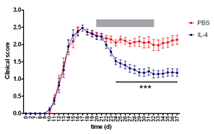
Christina Francisca Vogelaar
Johannes Gutenberg University Mainz, Germany
Title: Fast direct neuronal signaling via the IL-4 receptor reverses disease severity in progressive neuroinflammation
Biography
Biography: Christina Francisca Vogelaar
Abstract
Ongoing axonal degeneration is thought to underlie disability in chronic neuroinflammation, like multiple sclerosis (MS), especially during its progressive phase. Upon an inflammatory attack, axons undergo pathological changes, including a rise in calcium and axonal swelling, which we and others have shown can be reversible. Recently, we reported beneficial effects of interleukin 4 (IL-4)-producing T helper 2 (TH2) cells on neurons upon traumatic CNS injury. Here, we demonstrate that intrathecal IL-4 treatment during the chronic phase of several models of experimental autoimmune encephalomyelitis (EAE) is capable of reversing disease progression without changing inflammation. IL-4-induced axonal repair was mediated through a fast and direct neuronal IL-4R signaling pathway leading to cytoskeletal remodeling. Since IL-4R was found to be expressed on axons and axonal swellings in human MS brain, targeting neuronal IL-4 signaling may offer a new therapeutic strategy to halt disability progression in MS and possibly other neurodegenerative conditions. We are currently working on the development of new IL-4 analogues to translate this work to the clinic.

Figure 1: IL-4 ameliorated disease progression in Bl6 MOG EAE mice injected intrathecally for two weeks with IL-4 or PBS during the chronic phase (grey bar).

